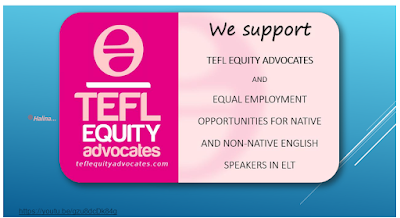6th August
What about Non-Native Online English Teachers?
The speaker of this webinar was Halina Ostankowicz - Bazan who presented an interesting debate about Native English Teachers and Non-Native Online English Teachers as she faced discriminations on quite a lot of occasions.
I was online and could follow this interesting webinar which took place on 6th August.
The Presenter is a non-native ESL teacher with lot of experience in teaching English.
The focus of the webinar started with a question as Halina said that she has often felt she has been considered discriminated: NATIVE ENGLISH TEACHER or NON-NATIVE ENGLISH TEACHER? This is my question.
We had a poll online and we found that most of the teachers who were doing the webinars were Non-native English teachers. She also added that an important linguistic like David Crystal had never mentioned the issue of Native and Non-native English speakers. What really mattered were the competences of the teachers.
The discussion continued online when she spoke about the issue of how Non-native English teachers speak English.
In her presentation she referred to an organization that is aimed at promoting TEFL equity.
https://teflequityadvocates.com/
When I was following the webinar I checked the website and I found some interesting videos : they are worth checking : https://teflequityadvocates.com/resources/videos/
Like many people online I connected and interacted with the Others about what Halina said and although I did not make any specific questions I realized that I have often felt myself a sort of less able teacher because I was not a native speaker. But in my reflections online I wrote that many Non-native speakers can be better teachers. For some pronunciation can be a problem, but in Europe we have a lot of teachers who have been abroad and have studied abroad and thus we are competent language teachers.
The topic discussed is relevant to my present situation of ESL teacher as I often work with Native English speakers in school but I have also found some teachers who are not so good at interacting with students. Families want to have some more tuition in English but the quality is not always so good although they want to have English mother tongue teachers in class.
When I discovered the organization TEFL EQUITY I was surprised. I had never heard about it
before.
I was felt that Halina was right in asking to be given the opportunity of working online like some English Native Teachers are doing now but I thought also that it will take time before more teachers will be given this opportunity.
Challenges? I am not teaching online and I work in my country in state schools and also privately : I think that if I had to set up some online courses I might have to face some problems! Anyway, I would be ready to face them as I am a life-long learner and I have learnt how to work online thanks to many Moocs and courses which I have done and where I was able to work together with other teachers.
In the future I will probably try to read and learn more about this issue as I feel that lots of teachers like me are qualified. By the way, I did my first teacher training in the UK and I took a Trinity College TESOL Certificate many years ago. I began teaching having the same qualification of the Native speakers and I had been doing English at school and university, this meant that I had more competences as I had studied the language, the culture and also Literature or the many Literature in English for my State exams . In addition I had done three foreign languages and this meant that I had had to face difficulties in learning them.
What next? This is my question to Halina. Do you think you will be given more opportunities?
I am optimistic and I can see that languages and projects are important in our schools and in Europe.
I think that I have some more opportunities for developing and for working online as an English Language Teacher.
Here is the recording of the webinar






Nessun commento:
Posta un commento